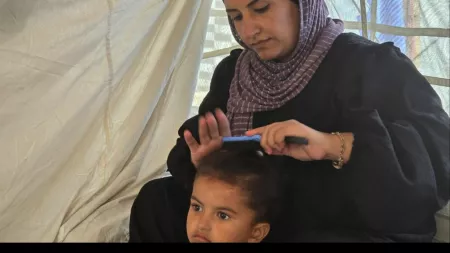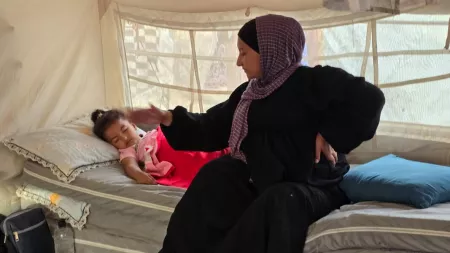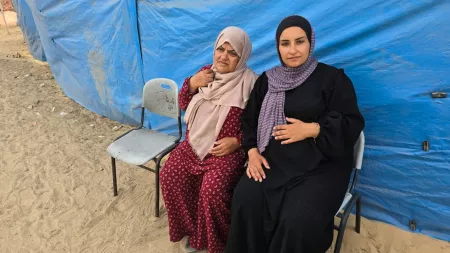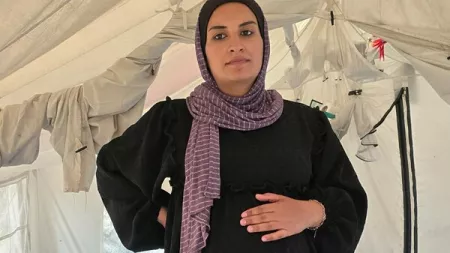Zenab*, 33 years old, is expecting her second child. Since the Rafah invasion, she lives with her 3-year-old daughter Lila* in a tent in the Khan Younis area. She told CARE about the hardships she has encountered over the past months, including the death of her husband, being pulled from under rubble multiple times, and the challenges of getting medical check-ups during a high-risk pregnancy when health centres are overcrowded and difficult to access.
Fear
“My name is Zenab*, and I am 33 years old. I am originally from Gaza City and have a three-year-old daughter called Lila. We are now displaced in the Khan Younis area. I have been pregnant since the beginning of this war, and my baby is due next week, on the 1st of June. I learnt of my pregnancy on the 4th of October. I had three days to feel happy, then the war started. There has not been any time to feel joyful or excited since. I have suffered a lot these past months. We had to constantly move from one place to another. Sometimes I felt like I could not walk or respond to the people around me because I was so worried, petrified by fear and horror, the destruction and killing around me.
All I could think of was how hard our lives now are, how we would be able to survive, and whether things would ever get better again for my daughter and unborn child.
Displacement
One of the worst days of my life was probably when we first had to leave our house. It was around 2 a.m. when our neighbourhood was bombed. Everything around us was full of dust and fire. They rescued my daughter and me from underneath the rubble of our house, and we were taken to a hospital. In the hospital they told me that both my unborn child and I were in danger. My daughter and I stayed at the hospital for a few days, where we slept on thin mattrasses on the cold floor. All I could think of was how hard our lives now are, how we would be able to survive, and whether things would ever get better again for my daughter and unborn child.
Sometimes I had to walk for hours to different pharmacies, hospitals, and health centres to see if anyone had my medication available. It was like walking through hell, and until today it is hard for me believe that all three us of have survived until now.
Grieve
A few weeks later, on the 2nd of December, my husband was killed when he went to the market to get food for us. We were still in Gaza City, and I didn’t know what to do or where to go. I was grieving, missing my husband, and in absolute horror not knowing what to do without him. I tried to reach the rest of my family, who had already fled to Rafah. It took forever to get hold of them, because all the phone connections were down. I ended up staying with a neighbour for a while, who kindly took me in.
For me, as a pregnant woman, there has been hardly any health care support, no proper hygiene and sanitation, and no suitable mattress to sleep on.
In March, when I was sixth months pregnant, I knew I finally had to flee to the south. I was suffering from complications during my pregnancy. We didn’t have enough water to drink, and we had hardly any food. The doctors again told me that my pregnancy was in danger.

Hell
It was also hard to get the medication I needed. Sometimes I had to walk for hours to different pharmacies, hospitals, and health centres to see if anyone had my medication available. It was incredibly difficult to get to the south. We left at 6 a.m., but there were no cars or other means of transportation as the roads were blocked. So, with my belly in pain, I walked for over three hours with my daughter, rode on a donkey cart, and then walked again for kilometres, until we were able to get a car to Rafah. Everywhere around us bombs and missiles were falling. It was like walking through hell, and until today it is hard for me believe that all three us of have survived until now.
I also constantly worry for the life of my little daughter. Lila has seen so many dead people and so many body parts lying around after the bombardments. She is scared all the time.
For me, as a pregnant woman, there has been hardly any health care support, no proper hygiene and sanitation, and no suitable mattress to sleep on. Every time I need to go to the hospital for any check-up, I worry whether I can reach the hospital or health clinic. Will there be transportation? Will I survive the journey? Will there be more bombing? Often, I was too afraid to go to the hospital. Too afraid I could suddenly be killed and also afraid of catching infections from all the sick people in the overcrowded hospital. In the north, I had to stay at the hospital because I had complications due to the lack of food and sanitation. It was so crowded, and people around me were very sick.
It is hard for me to fathom what has happened to us. We used to live a good life.
Death
All these months, there was death and destruction, diseases and suffering all around me. I have been pulled from underneath the rubble multiple times and suffered a lot from the smell of phosphorus. I also constantly worry for the life of my little daughter. She has been ill a lot: her stomach constantly hurts, and she suffers from the heat in the tent, the lack of food, and all the insects biting her. Lila has seen so many dead people and so many body parts lying around after the bombardments. She is scared all the time. Even when she sleeps, she covers her ears, afraid of the sound from the bombardments.
There is no comfort or respite. How will I manage living under these circumstances once the baby is there?
Uncertainty
Lila keeps asking me when we will go back home. ‘When will I get to be in my room? When can I play with my toys again?’ Until now, I haven’t told her that our house was burnt down, and that there is nowhere to return to. I try to cheer her up that she will soon have a little sister to play with, but I think she can see right through my sadness. She is playing with sand under the hot sun – what else is there to do? She also accompanies me when I get firewood for the cooking, or when I try to find water or food.
How can I keep Lila safe? How can I also take care of her unborn baby sister? How are we going to make it through the summer, in the middle of the desert, living in a tent with a toddler and a newborn? The next months are going to be very hard.

Surviving
What makes me feel better is that at least now I have more family around me. They help me a lot and I am glad that I am not alone anymore. With my husband dead, I rely on my parents and my eldest brother. We have not received any support from aid organizations since the border closed, and the situation has gotten much worse since we had to flee Rafah after the invasion. Here in Khan Younis, we live in a tent. The water is contaminated and not safe to drink. We have hardly any water to clean ourselves or wash our hands and clothes. There is no clean bathroom, and I worry I will get sick every time I go.

Most of the time, I eat canned food. I still remember my first pregnancy, when I especially made sure to eat vegetables and fruits, and drink lots of water. None of this is now available. The doctors told me, that my poor health and nutritional status could result in an early birth, which is why they scheduled a caesarean a few weeks ahead of the due date. It is hard for me to fathom what has happened to us. We used to live a good life. We tried to make the most out of our situation, despite the ongoing occupation. We had a nice house, and my husband took good care of me. Now, we have nothing. It makes me very sad that this is the turn our lives took, and that my husband will never get to meet our new baby.
I am glad that I found a hospital, but I don’t know how long I can stay there to recover.
Birth
The most difficult part for me right now are the nights. Sleeping is a nightmare. We don’t have a proper mattress, and the ground we sleep on isn’t even. My back hurts so much, and my legs and arms are constantly in pain. There is no comfort or respite. How will I manage living under these circumstances once the baby is there?
I want to give birth in peace and in clean and sanitary conditions. I keep praying for all the other pregnant women in Gaza that the war will end.
The C-section is scheduled for the 1st of June. I am glad that I found a hospital, but I don’t know how long I can stay there to recover. I’ve heard that some women had to leave the hospital right after giving birth because there is simply no space. I am afraid how I will recover from a C-section, living in a tent, sleeping on a lopsided, sandy floor without proper health care.
It makes me very sad that this is the turn our lives took, and that my husband will never get to meet our new baby.
Hope
My biggest wish these past months has been that the war ends. I want to give birth in peace and in clean and sanitary conditions. I keep praying for all the other pregnant women in Gaza that the war will end. Every time I hear of new negotiations happening, I get hopeful. But then, again, nothing happens apart from more destruction and horror. Sometimes, when things are very difficult, when the war and searing temperatures are particularly unbearable, I pray to God to take my soul, so I don’t have to live like this.
I would like the world to know that it is pregnant women like me, and children like my little Lila and her unborn sister, who are suffering the most in this war.
An appeal to the world
But despite everything, I am still standing, and that I am proud of. The war has taught us many things, but the most important thing is probably patience and to feel empathy for and support everyone around us.
I would like the world to know that it is pregnant women like me, and children like my little Lila and her unborn sister, who are suffering the most in this war. I want people to know that we have nothing to do with this war, and all we wish for is peace and to raise our children in a world where they have a future.
*Name changed to protect the respective identity.
